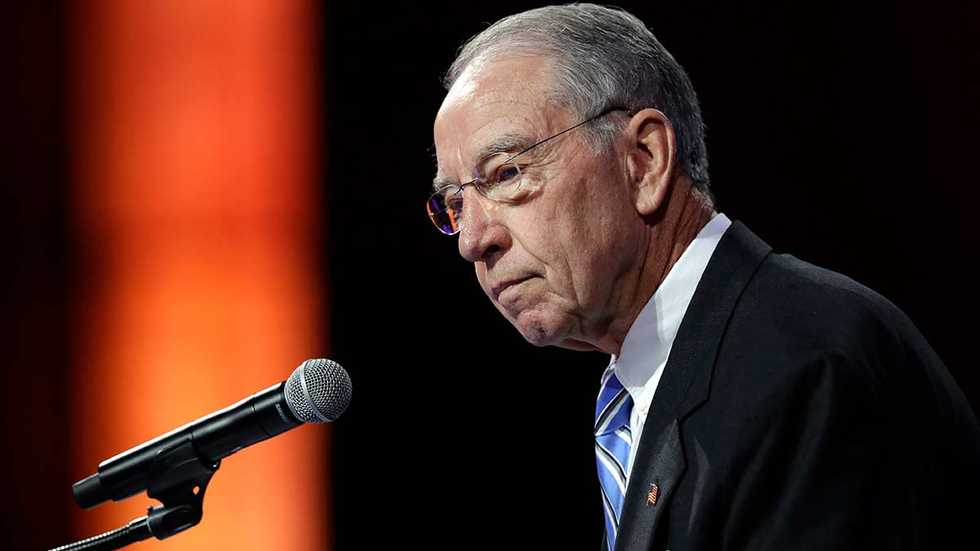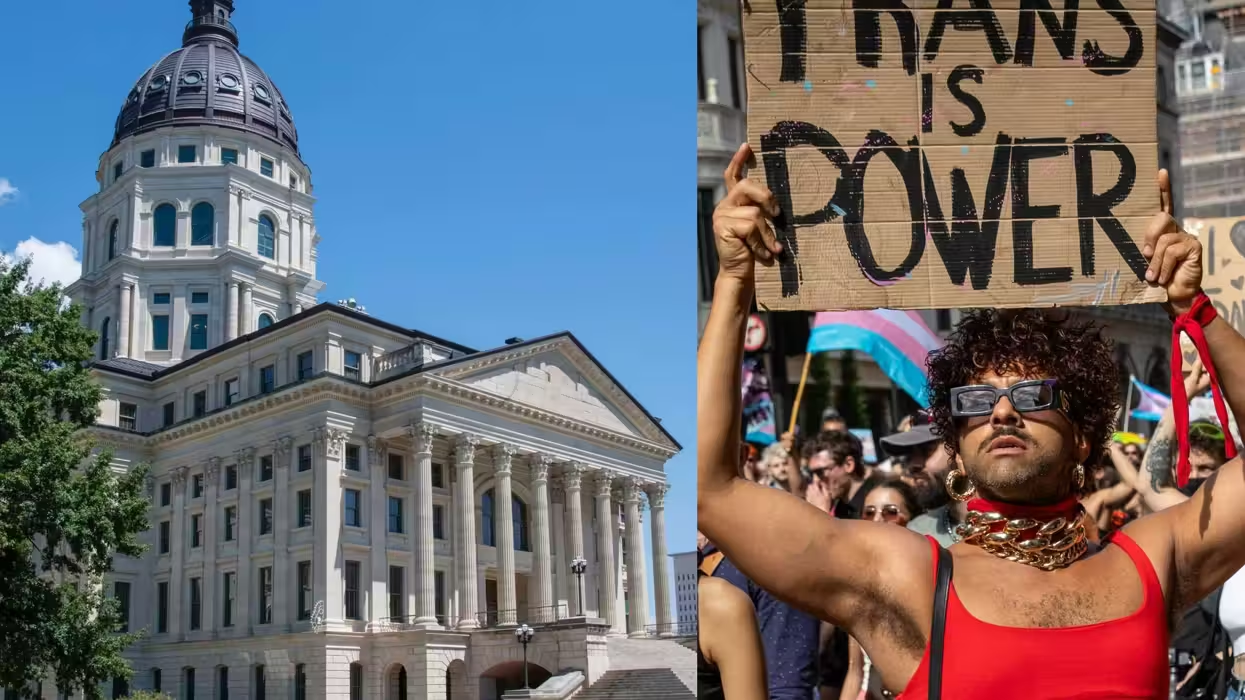
© 2026 Blaze Media LLC. All rights reserved.
Editor's Note: The title of this article has been updated for clarity.
If you want a good example of why voters’ frustration with Washington is sky-high, look no further than Senator Charles “Chuck” Grassley, R-Iowa (D, 68%).
Grassley — currently seeking his seventh term in the Senate this fall — has apparently reached the point where he will do and say just about anything to stay in Washington. That includes pushing legislation that puts American lives at risk and uses the (increasingly unreliable) Congressional Budget Office to hide the true costs of that legislation. Grassley’s current Judiciary Committee team has also made statements in the past indicating they know full well that legislation calling for the retroactive release of tens of thousands of federal inmates has a significant price-tag for taxpayers.
Conservative Review has obtained documentation that makes it clear that Grassley’s staff did a complete 180 in just one year on the costs of jailbreak, which raises questions whether the new CBO score is designed to conceal the true cost of his so-called sentencing reform bill. This congressional sleight of hand is what we usually expect from Democrats, but it is completely unexpected from a generally respected figure like Grassley. It also demonstrates the potency and power of the sinister jailbreak lobby being led by George Soros and its ability to change the views of senators in a matter of months.
Calculating the Fiscal Cost of Jailbreak
One of the major selling points used to entice conservatives into supporting the George Soros jailbreak agenda is that de-incarceration will save taxpayers a lot of money. Yet, before the Soros-train kidnapped Grassley and his integrity, it’s clear he rejected this argument outright.
On September 11, 2014, former CBO director Doug Elmendorf sent Grassley the budgetary score for the Smarter Sentencing Act (S. 1410, 113th Cong.) – a bill that also would have drastically reduced sentences for and provided for the early release of thousands of violent drug traffickers. The CBO’s assessment of the real-world results of the bill was not pretty. It noted that the bill would have resulted “in about 250,000 prisoners being released from federal prisons earlier than they would [have been released] under current law over the 2015-2024 period.”
While CBO did claim that the Department of Justice would save approximately $4 billion over that same ten-year period for retroactively releasing hundreds of thousands of inmates, it also stated that many of the released federal felons “would receive certain federal benefits sooner than they would otherwise be eligible to receive them,” a fact that would wind up costing taxpayers an additional $1 billion over the same ten-year period.
The CBO went on to detail that the release of these 250,000 federal prisoners over the next ten years would cost the American taxpayers at least $361 million more in Medicaid spending; at least $227 million in additional Obamacare subsidies and tax credits; at least $137 million more in Social Security and Medicare spending; at least $160 million more in Supplemental Security Income (SSI) spending; and at least $73 million in additional food stamp spending.
These are pretty significant costs — ones that would be cited by Republicans in virtually any other context — and they should give pause to those supporting “criminal justice reform” primarily as a cost-saving endeavor.
Furthermore, this price tag reflects only the immediate cost for federal benefits paid to the 250,000 federal felons who would be released over the course of a ten-year period. Even if you assume that CBO’s direct, federal benefit outlay price tag of $1 billion was spot on, it does not include the array of inevitable additional costs that would manifest at the federal, state, and local levels.
In 2008, Jeffrey L. Sedgwick, former Director of the Bureau of Justice Statistics, wrote in the Washington Post, “[T]he most conservative estimate for the cost of violent and property crimes in the United States is $17 billion a year — and that’s just direct, immediate cost.” The raw truth about the astronomical fiscal cost of crime is so embedded in the consciousness of even the politicians that during National Crime Victims’ Rights Week this past April, the Senate passed a resolution including this very finding from Sedgwick … even as both parties push legislation that will engender that very outcome.
Grassley’s Flip Flop on the Cost of Jailbreak
In 2014 and early 2015 – not ancient history – Grassley dedicated substantial time and energy, including several floor speeches, to shredding the Smart Sentencing Act. He debunked various talking points used by the bill’s supporters with statistics and facts, including the notion that jailbreak is a budget winner. In an exemplary floor speech on April 8, 2014, Grassley not only dispatched the idea that the Smarter Sentencing Act would be springing only non-violent federal prisoners from prison (by noting that the drug trade as a whole “turns on violence”), but also that the bill would “shift costs from prison budgets to crime victims” and lead to “increased crime and increased [numbers of] victims.” Untethered from any special interests overtaking his inherent common sense, Grassley’s opposition was forceful, but anchored in logic and experience.
Grassley’s statement in response to the CBO score of S. 1410 appears to be further proof that he intended to go to the mattresses against the bill. In that statement, he said that the bill “not only risks a rise in crime, but … will put taxpayers on the hook for close to $1 billion in entitlement spending” for released prisoners. Grassley opposition was impervious:
[m]andatory sentencing guidelines have proven to increase sentences, decrease crime and lessen [sentencing] disparities. Now throw in a $1 billion entitlement cost of the Smarter Sentencing Act, and you’ve got legislation that should never see the light of day. … The “smarter” in the bill title clearly doesn’t mean “smarter” budgeting on crime.
In an e-mail distributing the CBO score of S. 1410 to congressional staff in 2014, one of Grassley’s top aids rightly pointed out that the score demonstrated S. 1410 was a bad idea because it was playing a bit of a shell game with taxpayer dollars and would give welfare benefits to released federal felons.The e-mail reads as follows:
Who would’ve thunk ‘smarter sentencing’ would lead to higher medicare, SocSec, medicaid, and food stamp costs? So, even though appropriations costs may be reduced, direct spending and entitlements increase. More reasons to oppose the bill …
Why has Grassley Changed and Why is did the Cost of Jailbreak Disappear?
What is so remarkable, and yet remains unanswered to this day, is why Grassley — who so vociferously opposed the Smarter Sentencing Act, and was on the right side of this issue for so long — would so quickly and completely reverse himself. He now supports a bill this is arguably as bad and unwise as the Smarter Sentencing Act, if not worse. As late as March 10, 2015, Grassley delivered a floor speech deracinating every premise of the bill’s supporters. He even identified the toxic source of jailbreak – “the leniency industrial complex “ – in his own words. Yet, six months later, he introduced the new jailbreak bill (S. 2123), which incorporates every element and talking point he inveighed against just months earlier and for his entire career!
The CBO score for Grassley’s bill, called the Sentencing Reform and Corrections Act (S. 2123) — which is functionally the same bill as the 2014 Smarter Sentencing Act, but arguably worse, because it would render more drug traffickers (including people who smuggle drugs into the United States on submarines) eligible for release than even the Smarter Sentencing Act — looks entirely different than the score for S. 1410. This new score, which was likely requested by Grassley himself, inexplicably has a much smaller level of savings resulting from the release of thousands of felons from federal prisons ($318 million from 2017-2021, and at most an additional $722 million from 2017-2026, depending on factors like prison construction), and also a much smaller welfare-related price tag than was supplied in ($251 million total for direct federal benefits to released federal felons).
The score for Grassley’s bill also has this curious phraseology: “CBO estimates that enacting S. 2123 would not increase net direct spending or on-budget deficits by more than $5 billion in any of the four consecutive 10-year periods beginning in 2027.” Huh? This seems like a Washingtonian’s attempt to avoid saying outright that this bill will result in as-yet-indeterminate billions of dollars of deficit spending in later years for springing thousands upon thousands of dangerous people from federal prisons.
The disparities between the two bill scores are curious, given that Grassley’s S. 2123 would be letting more people out of federal prison than the Smarter Sentencing Act. Logic begs the question: if you are springing more felons from federal prison than a prior version of this legislation would have done, how can the amount of federal benefits you would be disbursing to these felons go down? It is worth noting at this point that, whereas the CBO score for S. 1410 in 2014 noted that the bill would result in the release of a quarter million federal felons over the course of the next ten years, the score of Grassley’s bill vaguely mentions that “thousands” of felons would be released.
Grassley’s seemingly desperate push for a bill — which would increase crime, damage public safety, and raise costs for the American people — reeks of an unfortunate attempt to score an election year “win” without regard to consequence. Grassley needs to answer more questions about this bill, including why it has to be done right this second, in the final moments of an administration that is chomping at the bit to sign this prison release bill. Surely, someone as senior as Grassley — who has spent almost a half century in Washington and fought against this type of legislation in the past — knows that no good can come of this bill, especially when it is being pushed by “the leniency industrial complex."
Want to leave a tip?
We answer to you. Help keep our content free of advertisers and big tech censorship by leaving a tip today.
Want to join the conversation?
Already a subscriber?
Blaze Podcast Host
Daniel Horowitz is the host of “Conservative Review with Daniel Horowitz” and a senior editor for Blaze News.
RMConservative
Daniel Horowitz
Blaze Podcast Host
Daniel Horowitz is the host of “Conservative Review with Daniel Horowitz” and a senior editor for Blaze News.
@RMConservative →more stories
Sign up for the Blaze newsletter
By signing up, you agree to our Privacy Policy and Terms of Use, and agree to receive content that may sometimes include advertisements. You may opt out at any time.
Related Content
© 2026 Blaze Media LLC. All rights reserved.
Get the stories that matter most delivered directly to your inbox.
By signing up, you agree to our Privacy Policy and Terms of Use, and agree to receive content that may sometimes include advertisements. You may opt out at any time.






